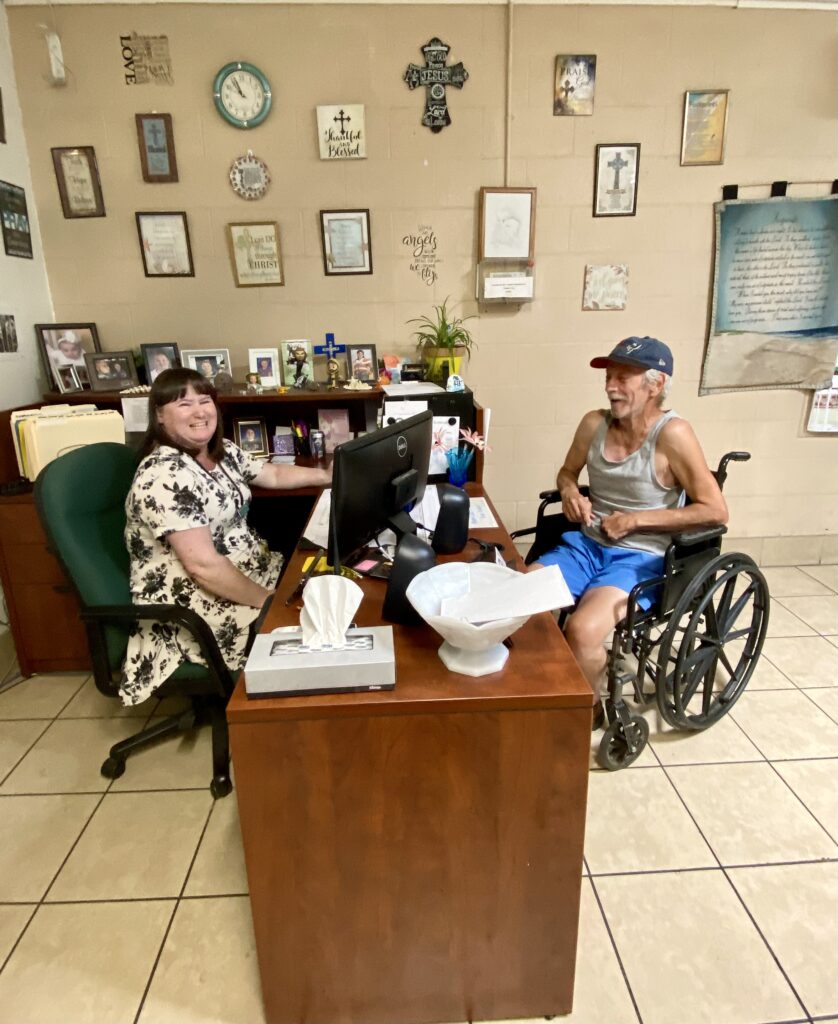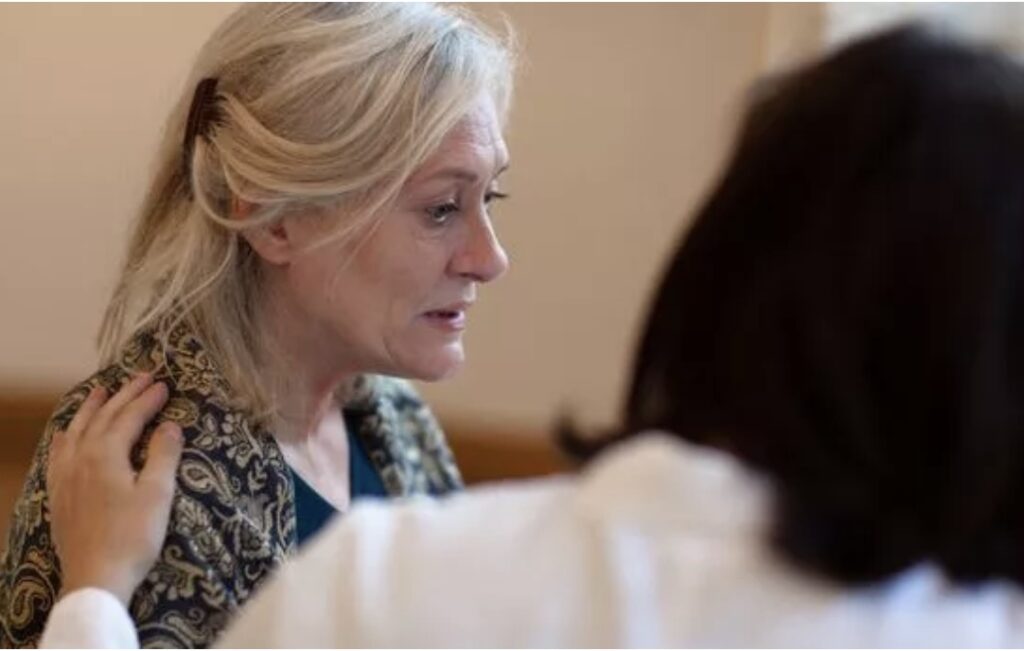The Carnie Kid: Rachel’s “Round and Round She Goes” Roller Coaster Life -Part 3
Read Part II here.
Part III: Shoe Soles and Old Souls: In which Rachel Finds Her Mission in Life


Because she was so impacted by chaplain Margaret, Rachel decided that she too, wanted to become a prison chaplain. So, she enrolled in Shasta Bible College where today she’s working on her B.A. in Bible and Theology with a minor in Biblical Counseling while working as a Mission Case Manager. And while she may not be working as a prison chaplain, she has no lack of opportunity to pour the love of God into the people who come off the street in need of help. Because as Rachel knows all too well, there are all kinds of prisons.
“I love my job,” says Rachel. “Because I do guest intakes, I get to hear every person’s story. They sit with me and we talk and I put all their information in the computer. During that process, I get to hear their hopes, their dreams, their pain. And then I pray with them. And sometimes I have the honor and joy of watching people’s life transform right before my eyes. Really, it’s so cool to be able to help somebody—even if it’s just helping them get a pair of shoes.”
There may not be a theological degree in sole winning, but in Rachel’s mind, a degree in soul winning, or evangelism, begins by first meeting a person’s practical needs. As Theodore Roosevelt once said, “People don’t care about how much you know until they know how much you care.” If that’s true, then Rachel has the equivalent of a Ph.D.
Leon’s New Lease on Life
Rachel, a compassionate person who can’t easily forget the people in her care, is a reminder to anyone who knows her story, that “He who is forgiven much, loves much.” She goes the extra mile with guests, including people like Leon. Leon, a disabled guest, has been at the Mission on and off for years. Rachel took a particular interest in Leon, and believed she could help him—particularly with his trigger temper that would often sabotage his efforts to make any real progress in life.

“When Leon got here, I started having him volunteer in various positions,” says Rachel. “One day, I convinced him to volunteer on the a.m. shift at the front desk because I knew he liked to get up early. I would go down there, and he would be reading his Bible as he drank his coffee. And he loved it so much that it became his daily routine.
“Slowly, he began to change. He lost a lot of his anger. He began to control situations better. People noticed. Not only that, after a long time of being homeless, he found housing. He now has this cute little house near Shasta City and was recently named as the Mission’s Volunteer of the Year.” Just a bit ago, he cooked his first cheesecake in his new kitchen and brought it to me!”
No doubt, a small change can make a big difference. In Leon’s case, a change of venue motivated him to do a deep dive into his Bible and not surprisingly, his personality began to change for the better. Eventually, it even changed his circumstances for the better. This brought Rachel joy because she knew how various people and circumstances “conspired” to change her own life. And it’s why she loves providing “soul care” to others.
Will Work for Dignity
While the demographics at the Mission are constantly changing, at present, it’s the “old souls” she’s been providing soul care for at the Mission. This presents its own set of challenges.
“Currently, at least 75% of our guests are elderly or disabled—and often, both,” says Rachel. “And as you can imagine, homelessness is particularly difficult for them. Because that generation isn’t exactly tech savvy. Tasks like filling out applications for social security is almost impossible for them. Even using their cell phone is a challenge. So, I help them with that.”
It’s also a case of finances. Even with social security, most of them can’t afford rent. Despite their age, many of them do want to work and are enrolled in Mission’s Work Search; however, some are forced to quit the search because of ageism in the work force. Those cheerful older greeters you see at WalMart and offering food tastings at Costco, represent only a fraction of a largely unemployed older population who are often “greyed out” of the workforce.

Rachel recalls one 74-year-old Mission guest who had worked all her life—until she was made redundant after the Chinese restaurant she had worked at most of her life, closed down. She enrolled in the Work Search program but after a while, she stopped turning her logs in because no one wanted to hire a 74-year old. She was demoralized.
How to Have a Perfect Memory
To make things worse, some older people there have memory issues or even dementia. So, they will forget how to do something, or even to show up for an important appointment. In these cases, Rachel will contact Adult Protective Services (APS); however, given that an APS case is only active for three months, the elderly guests are often left to their own devices.

“A lot of these folks end up staying here for long periods of time,” says Rachel. “And some of them are able to get social security which we help with. And they’re in our Money Savings Program, so they’re saving up money and hoping to get housing. But that’s also a long, hard process. And it makes me very sad, because there are other countries in the world where your elderly people are revered. When they can’t work any longer, their families take care of them.”
There is a bright spot in all this. Rachel shares about a group of elderly Mission guests, mostly women, who gather each day in the dining room to pray and just talk about their lives. Others sometimes join them. What’s remarkable about them, is that they find a way to help each other—even it’s only filling in those memory gaps. When one person forgets a word, or what they’re supposed to be doing, another one chimes in with just the right word or gives their fellow “golden agers” guidance as to where the other person intended to go but forgot.

It’s a reciprocal thing, so that between all the oldsters, collectively they have what amounts to a near-perfect memory. It’s a beautiful example of how the body of Christ is supposed to function—as an interdependent organism, where one person’s weaknesses is another person’s strength. Ideally, this model works intergenerationally as well. In the case of this particular group, they were fortunate enough to acquire a new member: a 40-something lady named Robin, who carries enviable currency at the Mission: a car.
Recently, Robin took the group to a music festival in the park. Another younger gentleman, a Mission guest, agreed to accompany one of the elderly ladies on a bus to the social security office to get a copy of her award letter. “Without the young man going with him, she would have most likely forgotten how to get back to the Mission,” says Rachel.

Reunited and It Feels So Good
Seeing how this type of interdependence works in action, inspires Rachel. It’s caused her to dream of how we in this country can really take care of our older population which historically we haven’t done a great job of doing.
“I have big crazy dreams of things that I would love to see happen,” says Rachel. For one, I would love to have some small communities, like Tiny Homes. These wouldn’t be pallet shelters, which are interim housing, but rather permanent homes. They would be self-contained, low-income communities where the elderly could live and interact with different generations, like they do here just organically. You would have people like Robin and others who help our older people. But it wouldn’t just be one-sided—they would derive benefit from the relationship too.”
For certain, Rachel has big dreams. But that’s the future and Rachel is very much in the present—lighting fires and putting out fires, as it were. For certain, it’s not a job for the faint of the heart. But the rewards are infinitely rewarding—and ultimately transformative for everyone.
“I see a person going through every phase of the mission,” says Rachel. “They start off in guest services and they may begin by having a meal. Or spending the night. And I’ve watched a person start off with nothing—they’re completely homeless, they have no belongings. They will come here, they will get some new clothes, they will join the work search program, find a job.
“And then they start saving money—maybe even buying the first car they’ve ever owned. From there, they get a HUD voucher, so they can find housing. And we’re able to help them do that—all the way through the process so their entire life is changed. And I can’t begin to tell you how good it makes me feel to watch them take advantage of all our programs and be successful”.
The girl who ran away to join the carnival, only to have her repressed childhood trauma erupt into a destructive detour of drugs and deceit—until the seeds her grandmother planted finally took root—perhaps summarizes it best when she says simply, “Families get reunited here. Broken people find healing here.”

___________________________________________________________________________________________
About the Author: Jenni Keast is the Mission’s marketing content coordinator and a lover of jean jackets, the Great Outdoors, photography and all things mid-century. Her favorite authors are Holy Spirit (the Bible) G.K. Chesterson, C.S. Lewis, Leif Enger and Walter Isaacson, to name just a few.
On March 31, 2022, Jenni was in a near-fatal auto accident. Miraculously , she survived and is finally back to doing what God has called her to do and what she loves best: storytelling…especially writing stories of transformation of people who were once stuck in cycles of homelessness and addiction but are now living free from the shame and bondages of the past. “So if the Son sets you free from sin, then become a true son and be unquestionably free” (John 8:36)!

